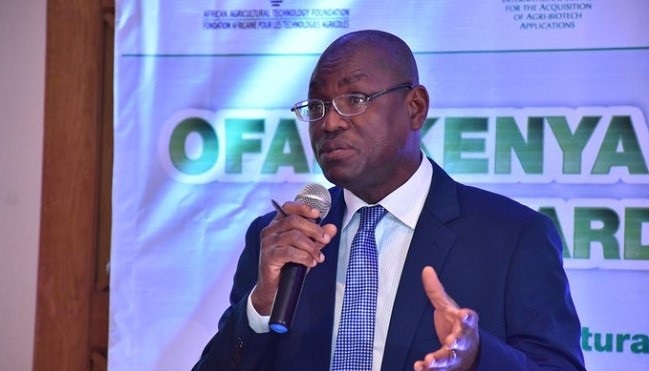Strong supportive voices for agricultural biotechnology are crucial for the effective deployment and utilisation of biotechnology for improved crop productivity in Africa. Further, more emphasis should be placed on farmer benefits and consumer preferences if biotechnology is to make impact.

This was said by Dr. Emmanuel Okogbenin, Director of Programme Development and Commercialisation at AATF, during the 23rd virtual annual meeting of China Association of Science and Technology (CAST).
Dr. Okogbenin also noted that good policies and governance are required to drive biotechnology uptake and seed system development to achieve Sustainable Development Goals and the Africa Union (AU) Agenda 2063 aspirations on the continent.
He added that for Africa to maximise the benefits of investment and science for improved prosperity of farmers and stakeholders as well as for the continent’s economic growth and development, it is crucial to develop the seed systems for scaling technologies.
The CAST event, anchored by the China Crop Science Society, was held on July 27, 2021.
Dr. Okogbenin noted that biotechnology is no longer viewed as an option but as a necessity that should be deployed alongside conventional breeding methods to improve genetic gains for enhanced crop productivity and value chain transformation in Africa.
“Africa is gradually evolving with advances in breeding; from classical to genetic engineering and now genome editing,” he said.
While citing the successful development and commercialisation of transgenic Pod Borer Resistant (PBR) Cowpea in Nigeria, Dr. Okogbenin told the meeting that the Bt cowpea, which was released in 2019 for commercial cultivation and officially launched in June 2021 in Nigeria, can improve yields by 70 – 400 per cent compared to the conventional varieties, with reduced use of pesticides by farmers from ten sprays per cropping season to just two sprays. The cultivation of Bt cowpea is best optimised under integrated pest management (IPM) strategy.
Dr. Okogbenin also highlighted the TELA Maize project as another success story in biotech applications for Africa where 128 climate-smart hybrids have been released to farmers. TELA is a public-private partnership that is working towards initiating commercialisation of transgenic drought-tolerant and insect-protected maize varieties to enhance food security in sub-Saharan Africa. PBR Cowpea and TELA are biotech focused projects being implemented across Africa by AATF and its partners to increase cow pea and maize productivity, respectively.
Dr. Okogbenin urged African governments and regional economic communities to strengthen and harmonise biotechnology policies and biosafety regulations to create an enabling environment for biotechnology development and deployment in Africa.
“African regulators should avoid adoption of strict regulatory regimes that will hinder application of new innovations in plant breeding,” he observed, adding that the continent should watch against the temptation of overregulating products of New Plant Breeding Techniques (NPBTs).
“NPBTs products need not be regulated as transgenics,” he advised.
The African Development Bank (AfDB) through the Technologies for African Agricultural Transformation (TAAT) have been promoting technology delivery in Africa through the Policy Enabling Compact activities led by AATF. In similar vein, the African Union Commission has recently established the African Seed and Biotechnology Partnership Platform (ASBPP) to support regional impact-oriented policies for the establishment of effective and efficient seed systems and enhanced application of biotechnologies for improved food and nutrition security in support of AU Agenda 2063.
On seed system development, Dr. Okogbenin underlined the need to facilitate policy reforms to create functional and efficient seed systems even as Africa transitions from informal to formal sector seed system.
Dr. Okogbenin called for prioritisation of accreditation of agro-input dealers and digital tools to increase access to quality agro-inputs.
He urged Africa’s leadership to invest in new farming technology including biotechnology — from better seeds to digital tools to machinery — as Africa’s best opportunity for transforming its agriculture system into an engine of economic growth that will have benefits far beyond the farm sector.
